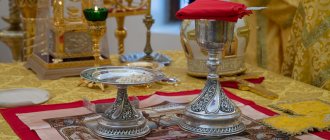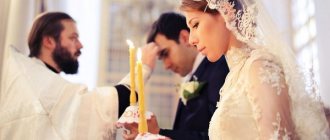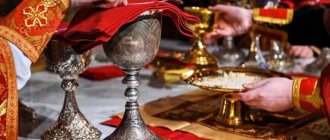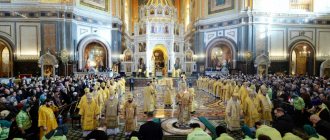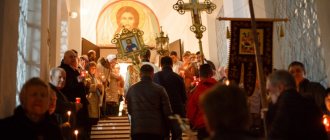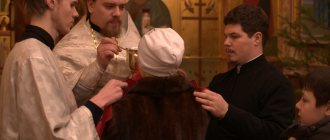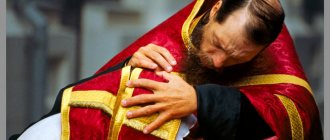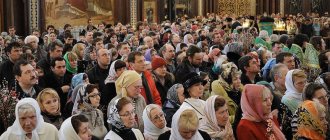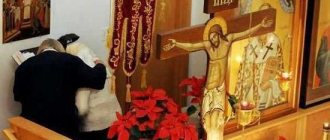Orthodox Life
There are two common mistakes regarding the communion of the Body and Blood of Christ. These two errors are diametrically opposed to each other.
The first is the lack of proper reverence for the Holy Gifts and some kind of “sanitary” disgust: “they say, everyone receives communion from the same spoon and everyone from the same Chalice, especially now, during a pandemic.” This mistake is typical for new Orthodox Christians in most cases.
The second mistake is excessive fear of communion. Not just the fear of God, but a far-fetched fear, when a person works himself up specifically for romantic or exalted reasons, trying to bring himself to certain ecstatic states. This mistake is mostly typical for churchgoers.
But, as the Monk Ambrose of Optina said: “Where it’s simple, there are a hundred angels, but where it’s sophisticated, there’s not a single one.” So it is with the Sacrament of the Eucharist. Everything is simple here too. Your job is to open yourself wide before communion and accept the Body and Blood of Christ. At the same time, observe a certain ritual, which was established primarily so that in vanity, emotionality and haste, not to knock out the Chalice or spoon with the Holy Gifts from the priest or, God forbid, not to spit them out. That's why we cross our arms diagonally across our chest in front of the Cup. If you want to bow to the ground, do it from a distance, but don’t fuss in front of the Chalice itself, there’s no need to bow. Cross your arms diagonally across your chest (the left one on the right shoulder, and the right one over the left one on the left shoulder) and walk with God to the Holy Chalice. Crossed hands are the same cross of Christ that we, as Orthodox Christians, place on the body. And at the same time, with this gesture, we seem to be removing our hands so that they do not move like the blades of a mill, interfering with communion or creating additional danger for the clergyman standing on the pulpit with the Holy Gifts.
Then go to the Chalice, say your name and open your mouth. Nothing more is required from you. Swallow the Body and Blood of Christ, wait until the deacon or sexton wipes your mouth, kiss the bottom edge of the Chalice (not the priest’s hand, not his cross, but only the bottom edge of the Chalice) and then, without kissing anything, go take the prosphora, eat it, wash it down with a drink , rinse your mouth well and swallow it all. Then you can freely kiss icons, crosses, etc.
Do not disdain the Body and Blood of Christ. Don’t let it bother you that EVERYONE comes to the Cup. Because our Lord Jesus Christ is One and His Body is One. And we all unite around Him into one whole. This is one of the main expressions of the Unity and Catholicity of the Church. It's all the same. All together, the whole world eats the Body and Blood of Christ and is saved. And not a single person has ever gotten sick from this. This is simply impossible. And drive away doubts. And do not dare to doubt the saving and life-giving nature of the Holy Gifts. Let us remember Paul’s words: “For whoever eats and drinks unworthily eats and drinks condemnation for himself, not considering the Body of the Lord. This is why many of you are weak and sick, and many are dying” (1 Cor. 11:29, 30). And “worthy” here means to approach with the fear of God and faith. There is nothing in this world higher and holier than the Body and Blood of Christ! Through Them, the Lord unites you with Himself. So what are you afraid of? Don't be afraid!
On the other hand, some churchgoers have the opposite mistake. They screw themselves up. Before the Cup, you must physically tremble, you must cry, you must feel disgusting. Or I will not receive communion because I am unworthy or unworthy. But, my dear, this is a huge misconception! No one is worthy! There is not a single person in the world worthy of communion. It is the mercy of God. Condescension into our unworthiness. Be careful, don't be a hypocrite! Don't act! Remember what happened before the first Liturgy in the world - at the Last Supper: “Then he poured water into the laver and began to wash the disciples’ feet and wipe them with the towel with which he was girded. He approaches Simon Peter, and he says to Him: Lord! Should you wash my feet? Jesus answered and said to him, “What I do you do not know now, but you will understand later.” Peter says to Him: You will never wash my feet. Jesus answered him: “If I do not wash you, you have no part with Me” (John 13:5-8). And if Peter had not agreed for the Savior to wash his feet, then Peter would not have had a part with God and would not have been saved. So don’t take yourself away from God. The Savior came to wash your feet, to minister to you through the priests. Do not take your lips away from the Cup, do not think excessively: “Now you do not know, but you will understand later.” Your job is to prepare, read the canons, follow Holy Communion, morning and evening prayers, confess, fast. And the rest is not your business, but the Lord God’s.
Now about the tears, trembling and trembling. Do not force, do not twist out of yourself those states that are not your merit and not your qualities, but the grace-filled Gifts of the Holy Spirit. Your job is to lament, come to a feeling of repentance, humble yourself and in peace, calm, with attention, as unemotionally as possible, approach the Body and Blood of Christ. And let your fear of God and faith be approximately the same as that of a clergyman. That is, the utmost concentration of attention is not on one’s condition, illnesses, etc. No. But only and exclusively on the Holy Gifts: “No matter how not to spill it, not to spit it out, how best to open your mouth, not to drip it, to receive correctly the Great Most Holy Relic.” This is what you need to think about when approaching the Chalice. Look at the priest at this moment, at the deacon or sexton, interact with them, listen to them, and not yourself. This also consists of obedience to the Church.
And I also want to appeal to all believers in general. The moment of the priests receiving communion at the altar is not an intermission in the theater. Don't relax. And do not relax those involved. This moment is akin to the moment of Holy Saturday. When all flesh is silent on the eve of the Resurrection of Christ. When the stone falls away from the tomb, the Royal Doors will open and you will see the Risen Christ with His Body and Blood, Abiding with us. This is a very great moment!
Archpriest Andrey Chizhenko
How to behave near the Chalice of Communion?
This story happened not so long ago in one of the churches in St. Petersburg. During the Divine Liturgy on Sunday, during the communion of the laity, the attention of the worshipers was attracted by a small blond boy standing near the altar. He looked attentively at the participants and from time to time burst into ringing childish laughter. They pulled him back, tried to reason with him, but in vain. With the end of communion, the boy’s unusual behavior also stopped.
The extremely surprised parents began to ask why he was laughing, and this is what they heard in response.
“When I looked at the people approaching the Bowl, I suddenly saw a white dove flying up to some of them. As soon as the uncle or aunt opens his mouth to swallow the Gifts, the dove pecks Them from the spoon and flies away. They don’t see this dove, they close their mouths and walk away, thinking that they received communion, but in fact they only held an empty spoon. This made me very funny.”
To an unbeliever, this child’s story may seem like fiction, but the Orthodox heart cannot help but shudder with trepidation, having understood the meaning of the vision sent by God to the child. In fact, isn’t it scary to realize that the Lord does not allow many of us to receive communion, because we approach the Holy Chalice in an unworthy, unprepared state.
“Whoever eats and drinks unworthily eats and drinks judgment on himself”
(1 Cor. 11:29) - the Apostle Paul admonishes us. The Charter has long defined requirements, the fulfillment of which helps the communicants worthily receive the Holy Gifts. This includes fasting from 1 to 7 days, abstaining from marital intimacy during this time, reading many prayers, and attending divine services - for everyone according to his strength and spiritual experience. It is obligatory to confess before Communion.
But now everything is done. The liturgy ends, and the communicant is ready to unite with Christ. The Royal Doors open.
“Draw near with the fear of God and faith...”
- proclaims the deacon. Faith and fear of God - this is what should be imprinted in the heart of everyone who approaches the Chalice. This is no place for talk and fuss. But in practice...
Who among us has not witnessed a crush in front of the Holy Chalice! People push others away, try to achieve the Holy Gifts as early as possible, and do not heed the admonitions of the priest. But unworthy behavior in front of the Chalice can in the blink of an eye undo all the painstaking work of fasting. Then the invisible dove will not allow us to access the Holy Gifts, and we will not gain eternal life in the sacrament, but condemnation and God’s punishment.
To prevent this from happening, each communicant needs to know well and follow the rules of approach to the Holy Chalice that the Church has established. Here they are:
Before the Chalice one must bow to the ground. If there are many communicants, then in order not to disturb others, you need to bow in advance. The bow is made not in front of the Chalice itself, but to the side;
When the Royal Doors open, you must cross yourself and fold your arms crosswise on your chest, your right hand on top of your left, and with this folding of your arms you must receive communion; you need to move away from the Chalice without releasing your hands;
You must approach from the right side of the temple, and leave the left free;
The altar servers receive communion first, then the monks, the children, and only then everyone else. You need to give way to your neighbors, and under no circumstances push;
Women need to wipe off their lipstick before Communion;
Approaching the Bowl, say your name loudly and clearly. Accept the Holy Gifts and immediately swallow them, and kiss the lower edge of the Chalice like the rib of Christ;
You cannot touch the Chalice with your hands and kiss the priest’s hand;
It is forbidden to be baptized at the Chalice! Raising your hand to make the sign of the cross, you can accidentally push the priest and spill the Holy Gifts;
Having gone to the table with a drink, you need to eat the antidor and drink the warmth. Only after this can you venerate the icons and talk;
If the Holy Gifts are given from several Cups, They can only be received from one. Taking communion twice a day is a terrible sin;
On the day of Communion, it is not customary to kneel, with the exception of bowing before the Shroud of Christ on Holy Saturday and kneeling prayers on the day of the Holy Trinity;
Arriving home, you should first of all read the prayers of thanksgiving for Holy Communion; if they are read in church at the end of the service, you should listen to the prayers there.
Basics of Orthodoxy
Similar
How to prepare for Holy Communion?
You must prepare yourself for the Sacrament of Holy Communion through prayer, fasting and repentance.
. In addition, it is very important to remember that preparation for Communion should not only be the fulfillment of certain instructions, but our entire life, built on Gospel principles. It is necessary not only to comply with disciplinary regulations, but to thirst for Christ, with all the strength of the soul to desire union with Him.
Home and church prayer
There is home and church prayer. Anyone who wishes to partake of the Holy Mysteries of Christ must prayerfully prepare himself for this: pray more and more diligently at home, attend church services.
On the eve of communion, it is customary to attend evening church services.
For prayer preparation for Holy Communion on the eve of communion, you need to read:
— Follow-up to Holy Communion
There is, in addition, a pious tradition (but not an obligation) of reading three canons and akathists before receiving the Holy Mysteries of Christ:
— Canon of repentance to our Lord Jesus Christ
— Canon of prayer to the Most Holy Theotokos
— Canon to the Guardian Angel
If a person wants to read canons and akathists and has time for this, then such reading can bring nothing but benefit.
Fast
Before Communion there is a liturgical fast (fast before Communion, which consists of not eating or drinking anything from midnight the day before Communion, for it is customary to approach the Holy Chalice on an empty stomach.). For newcomers who have fallen away and who have not observed the multi-day and one-day fasts established by the Church, the priest may establish an additional 3-7 day fast before Communion.
Fasting, in addition to food restrictions, also consists of eating and drinking less than usual, and also refraining from visiting the theater, watching entertaining films and programs, and listening to secular music. It is necessary to maintain bodily and mental purity. Spouses should abstain from physical contact on the day before and after communion.
On the eve of communion, from 12 o'clock at night, a strict fast begins - complete abstinence from drinking and food (in the morning, going to church for communion, you are not allowed to eat or drink anything; those suffering from tobacco addiction must also abstain from their passion).
Mood and behavior
Those preparing for Holy Communion must make peace with everyone and protect themselves from feelings of anger and irritation, refrain from condemnation and all indecent thoughts and conversations, spending time, as far as possible, in solitude, reading the Word of God (Gospel) and books of spiritual content.
Confession
Those who wish to receive communion must, on the eve, before or after the evening service, verbally confess their sins to God in the presence of a witness - a priest, sincerely opening their soul and not hiding a single sin they have committed and have a sincere intention to correct themselves.
Before confession, you must certainly reconcile with both the offenders and the offended, humbly asking everyone for forgiveness. The task of preparing for confession is to find specific qualities of your soul, character traits, actions, events or conditions that violate the Commandments of God, preventing communication with God.
During confession, it is better not to wait for the priest’s questions, but to tell him everything that weighs on your soul, without justifying yourself in anything and without shifting the blame to others.
It is more correct to confess in the evening on the eve of communion in order to participate in the liturgy in the morning. (Important! For your first confession in your life or after a long break, it is better to come not on Sunday, when churches are full of parishioners. The priest simply will not have time to confess you in detail. It is also advisable to warn the priest that you have never confessed sins before.)
As a last resort, you can confess in the morning, before the start of the liturgy. After the end of the liturgy, before communion in some churches, small children and the sick are confessed. Coming to confession when the liturgy has already begun is an extreme neglect of the Sacrament. Having confessed, you need to make a firm decision not to repeat your previous sins again. Without confession, no one can be admitted to Holy Communion, except for children under 7 years of age and in cases of mortal danger.
Before Holy Communion and during Holy Communion
Even before the opening of the royal doors and the removal of the Holy Gifts, it is best soon after singing “Our Father,” you need to approach the altar and wait for the removal of the Holy Gifts with the exclamation “Come with the fear of God and faith.” In this case, it is necessary to let the children who receive communion first go ahead, before the adults. When approaching the Chalice, you need to bow in advance, from afar, and fold your arms crosswise on your chest (right over left). There is no need to cross yourself in front of the Holy Chalice, so as not to accidentally push it. Approaching the Chalice, you need to clearly pronounce your full Christian name, open your lips (mouth) wide and reverently, with full consciousness of the holiness of the great Sacrament, accept the Body and Blood of Christ and immediately swallow.
After Holy Communion
Having received the Holy Mysteries, without crossing yourself, kissed the edge of the Chalice and immediately went to the table to taste a particle of the antidor and wash it down with warmth. It is not customary to leave the church before kissing the altar cross in the hands of a priest. After this, you need to listen to prayers of gratitude (or read them when you come home).
On the day of Holy Communion - make special efforts to behave reverently and decorously, in order to “honestly keep Christ accepted within you.”
Liturgy and Communion: how to properly prepare for Sunday service in church?
What happens on Sunday morning in church? What do you need to know to come to church service on Sunday?
Liturgy and Communion - what is the difference?
Liturgy is the name of a church service, and communion is the reception (with proper preparation) of the holy gifts. Communion is like a fresh new shirt - you can’t put it on a dirty body. Communion is given as a reward for fasting and intensive reading of prayers.
How to prepare correctly for church services on Sunday (for the Liturgy) if you want to receive communion?
If you decide to visit the temple on Sunday “in full”, then you should prepare in advance. The Sunday morning “strongest” service in the church is called Liturgy (when they receive communion, that is, the priest gives “the blood and body of Christ” = a piece of bread in wine). We can talk a lot about the benefits of communion, but here we will talk about how to prepare for it:
- You need to prepare a couple of days in advance.
— You must fast at least Friday and Saturday: do not eat animal food, do not sin: do not drink alcohol, do not engage in “marital intimacy,” try not to swear, do not offend or be offended. - on Saturday, read 3 canons at night (it will take about 40 minutes) (the canon of repentance to our Lord Jesus Christ, the canon of prayer to the Most Holy Theotokos, the canon to the Guardian Angel) + another 35 minutes “Following to Holy Communion.” - in the evening you should also read prayers for the coming sleep (about 20 minutes) - after midnight do not eat, drink or smoke, that is, go to bed before 00-00.
When should I come to church before the Sunday morning service (Liturgy)? When does Sunday morning service start?
We arrive at church around 7-20 (but better check the schedule). Until then you need to:
- be strictly on an empty stomach, incl. no smoking. You can only brush your teeth, and then try not to swallow anything.
- read the morning rule (min 15-20)
In the church itself? when the Liturgy and Communion take place:
- we write notes for health and peace (or simple ones)
- We come up and kiss the central icon.
- We put candles on whoever we want (I usually put 3 candles: on the main candlestick, for the saint at will and for the repose).
There is no need to light candles during the service itself, as this distracts everyone.
— We take our place in line for confession. It usually starts at 7:30 (again, check the schedule of services in your church). Let's confess. — we take a place: men on the right side of the temple, women on the left. — The liturgy lasts about 2 hours. All this time we listen to prayers, think “about life, what we did wrong where” and all the time we repeat “Lord Jesus Christ, Son of God, have mercy on me a sinner.”
Time usually passes quickly during Liturgy and Communion.
When everyone began to read the “Creed”, it means that the communion itself will soon take place. — When everyone began to read the “Our Father,” it means that communion will be held very soon. — When the priest brings out 2 large bowls for the first time, we simply bow our heads. — When the priest brings out the small cup (it contains communion), we bow and kneel. — They can carry alms trays around the church. Donate as much money as you like there.
What to do during the communion itself?
- Communion: small children receive communion first, then men, then women. Only those who have prepared correctly have the right to receive communion. Don't anger God.
- When approaching communion, we cross our arms over our chests (the right one is at the top). We approach the bowl as close as possible. We do not cross ourselves, so as not to touch the thicket. We say the name, open our mouth, eat Communion from a spoon, let ourselves be wiped, kiss the cup and go eat and drink.
- On a special table we take a small cup of water and a piece of prosphora. They eat and drink so that the pieces of Communion get completely inside and do not accidentally fly out with saliva or something else. It’s better to drink it first and then eat the prosphora.
- We wait until the end of the service to kiss the cross. The priest can say “Participants, listen to the words of the prayer of thanksgiving” - then let’s go listen to the prayer. If this does not happen, then at home we read “Prayers of Thanksgiving for Holy Communion.”
What to do after receiving Holy Communion?
- We no longer kneel anywhere: neither in front of icons, nor during the rest of the service.
- We wait for the end of the service and kiss the priest’s cross.
- We read prayers of thanksgiving for Holy Communion
- you can go home. Immediately after communion, do not immediately smoke or drink alcohol (at least eat normally first). Do not desecrate the Sacrament.
The Body and Blood of Christ is a terrible and at the same time saving shrine. If a person approaches the Chalice unworthily, then he can take communion to his own detriment.
Let us remember the words of the holy Chief Apostle Paul: “For whoever eats and drinks unworthily, he eats and drinks condemnation for himself, without considering the Body of the Lord. That is why many of you are weak and sick, and many are dying. For if we judged ourselves, we would not be judged” (1 Cor. 11:29–31).
Therefore, we must make ourselves vessels of God, purifying our body and soul as much as we can in order to receive the Body and Blood of Christ. This cleansing should usually last several days. In Orthodox ascetic literature it is called fasting. An Orthodox Christian fasts for several days (two, three, four, depending on human strength). Does not eat food of animal origin. If there are no great fasts (there are four of them a year), then fish and other seafood are allowed during fasting. If a Christian receives communion during Lent and Dormition, then one must not eat fish. And on Rozhdestvensky and Petrov it is not customary to eat fish on Wednesdays and Fridays. Also, on the days of fasting and on the day of communion, marital relations are limited. On the day of communion itself, you need to keep the Eucharistic fast. According to the Charter, it lasts six hours. But in church practice, the Eucharistic fast usually begins at twelve o’clock at night on the day of communion. From this time until the moment of communion, you cannot eat or drink anything.
The food fast is accompanied by a prayer fast. A few days before communion, a person usually devotes more time to prayerful communication with the Lord; before the day of communion the day before, it is customary to read the canon of repentance to the Lord, the canon of prayer to the Most Holy Theotokos and the canon to the Guardian Angel. On the day of communion, before the Liturgy, the Follow-up to Holy Communion is read. These are generally accepted prayers.
Before the Liturgy on the day of communion, you should also attend the evening service, which forms a single whole with the Liturgy, and prepare to receive the sacrament by confession.
If there is no Lent or any other fast, then on the day of communion itself after the Liturgy, the believer can eat all types of food.
In certain situations, fasting and reading are weakened.
Fasting, prayers and even the Eucharistic fast are completely omitted if a person is on his deathbed, that is, if there is a threat of imminent death.
Certain adjustments are applicable for a mentally ill person.
On the advice of a confessor, fasting and prayer rules can be relaxed for a seriously ill person.
Physical fasting for pregnant women is completely omitted. But observance of the Eucharistic fast before communion is mandatory.
Recently, a wonderful document “On the Participation of the Faithful in the Eucharist” appeared in the Church, which was approved at the Bishops’ Conference of the Russian Orthodox Church, held on February 2-3, 2015.
Here are a few excerpts from it: “The current practice, according to which a person receiving communion several times a year fasts for three days before communion, is fully consistent with the tradition of the Church. It should also be recognized as acceptable the practice when a person who receives communion weekly or several times a month, and at the same time observing the multi-day and one-day fasts specified in the Charter, proceeds to the Holy Chalice without additional fasting, or maintaining a one-day fast or fasting on the evening of the eve of communion. A decision on this issue should be made with the blessing of the confessor. The requirements of preparation for Holy Communion, addressed to the laity who frequently receive communion, also apply to clergy.”
Now there is a pressing question regarding the communion of the laity on Bright Week. From the same document:
“A special case in relation to the practice of preparing for Holy Communion is Bright Week - the week after the holiday of Easter. The ancient canonical norm about the obligatory participation of all the faithful in the Sunday Eucharist in the 7th century was extended to the Divine Liturgy of all days of Bright Week: “From the holy day of the Resurrection of Christ our God until New Week, throughout the entire week, the faithful must in the holy churches continually practice the psalm and singing and spiritual songs, rejoicing and triumphant in Christ, and listening to the reading of the Divine Scriptures, and enjoying the Holy Mysteries. For in this way we will rise together with Christ and ascend” (66th canon of the Trullo Council). From this rule it clearly follows that the laity are called to receive communion at the liturgies of Bright Week. Bearing in mind that the Rules do not provide for fasting during Bright Week and that Bright Week is preceded by seven weeks of the labors of Great Lent and Holy Week, one should recognize the practice that has developed in many parishes of the Russian Orthodox Church in accordance with canonical tradition, when Christians observing Great Lent during Bright Week They begin Holy Communion, limiting their fast to not eating food after midnight. A similar practice can be extended to the period between Christmas and Epiphany. Those preparing for communion on these days should take special care to guard themselves from excessive consumption of food and drink.”
That is, if a person fasted during the Nativity Fast and Lent, then on Christmastide (from the Nativity of Christ to the Epiphany of the Lord) and Bright Week (from Easter to Antipascha) he may not keep a food fast (such fasting is prohibited on these days) , however, must keep the Eucharistic fast. Prayerful preparation is always appropriate. During Bright Week, the traditional prayer rule for Holy Communion changes. Instead of morning and evening prayers, the hours of Holy Easter are sung or read. Instead of canons - the Easter canon. Follow-up to Holy Communion remains unchanged.
If a person wants to receive communion on Easter night itself, then he should traditionally fast for six hours, that is, from approximately 19.00-20.00 on Saturday, he should not eat or drink anything until the moment of communion.
Often churchgoers have the opinion: “I am such a sinner that I am unworthy to approach the Chalice.” I remind you that there are no people on earth worthy to approach the Cup. If you have endured the feat of fasting, then approach the Chalice with the fear of God, because Christ came to earth not to the righteous, but to repentant sinners.
And communion, as the holy fathers say, is the closest possible union of God and man. In it is our salvation, joy and bliss.
Priest Andrey Chizhenko
We have a request for you...
The articles on our website cover all parishes of the Gagauz autonomy. To continue the fruitful operation of the site, we need your help!
Please support the website "Orthodox Gagauzia" .
You can send us any donation to keep the site running. We can't do it without your help! Donate
How to take communion: tips for those taking their first steps in church
"Evening Moscow" published a collection of "10 rules that you need to know when visiting a temple." We present to you the first chapter of this book, dedicated to the Sacrament of Holy Communion.
Before Communion, you need to fast, take part in the evening service the day before, read the Follow-up to Holy Communion in the prayer book, confess and obtain permission from the priest for Communion. Approaching the Chalice, fold your hands on your chest, place your right hand on your left. When standing in front of the Chalice, it is not customary to cross yourself or bow. After receiving Communion, it is customary to kiss the edge of the Chalice.
Archbishop Mark (Golovkov) of Yegoryevsk, head of the Patriarchate’s department for foreign institutions:
— The Sacrament of Holy Communion is the most important part of the divine service for a layman. It should be taken extremely seriously. You need to prepare for Holy Communion in advance. The following approach is usually practiced: a person preparing for Communion fasts for some time, depending on the blessing of the priest, then, on the eve of Communion, comes to the evening service and prays. On the eve of Communion, you should not eat or drink at all in the evening, but this rule can be violated, for example, if a person’s health does not allow him to follow strict fasting. In this case, relaxations are possible. There may be a special prayer rule, also with the blessing of his priest. Before Communion, the parishioner must read the Follow-up to Holy Communion (the set of prayers for Communion, during the period of Great Lent and other fasts the reading order changes. - Ed.). Then the layman comes to the Divine Service, he confesses either the day before or immediately before Communion, receives absolution from his sins and is allowed by his priest to the Sacrament of Communion. In ancient times, Christians received communion on the eve of the Liturgy, that is, before the Divine service. Over time, the order has changed.
It is very important that a person prays meaningfully, listens to the words of the prayer, and does not show any unfriendliness towards the people who stand around him. There is such a procedure: when many people are receiving communion, it is important not to get ahead of others in line, not to show any aggression or irritation. Wait with humility. As a rule, many people prostrate, but this is usually also done on the eve of Communion. Before approaching the Chalice, you should fold your hands on your chest, place your right hand on your left, open your mouth and receive Communion. When standing in front of the Chalice, it is not customary to cross yourself or bow. There are times when this is done, but it is inappropriate.
Before leaving, after taking Communion, it is customary to kiss the edge of the Chalice. This is a Russian tradition; in the Greek tradition, the Cup is not kissed. After receiving Communion, the parishioner’s lips are wiped. One more detail - before taking Communion, a person says his name. There are certain subtleties: if the worldly name and the name with which one was baptized do not coincide, one must pronounce the name with which the person was baptized. After this, the person receiving communion leaves and goes to a specially prepared place, where a drink awaits him, so that particles of the Body of Christ do not remain in the mouth. After this, the person must wait until the end of the service to read the Prayers of Thanksgiving for Communion. If a person is in a hurry to get holy water or to run errands, Prayers of Thanksgiving should be read at home. On the day when a person has received Communion, one should not get carried away by vanity and shows, including those on television. All day you should be in peace, tranquility, without passions and emotions.
One should dress for Communion as for a holiday, neatly, but at the same time modestly, not provocatively, so that other parishioners do not have any temptations. And you should behave calmly and reservedly in the temple. It is always, in all cases, better to be guided by common sense and understanding. In the Temple you cannot judge yourself and others. Neither in clothes, nor in behavior. The most sensible thing for an Orthodox person is to be guided by humility.
In connection with Holy Communion, many temptations and temptations arise. And after Communion these temptations become even greater. It is important to remember at such moments that we are Partakers of Christ.
Communion often heightens the importance of a person's choice of who we are with and who we are. Why we take communion and why we live. When a person rarely receives Communion, I deliberately make sure that people are afraid of Communion. To be treated with due awe and respect. On the day of Communion, more people are tempted by the devil than usual. Temptations and temptations can be very different and take any form. You need to hold on with all your might, try not to succumb to the evil one. This is why it is very important to remain quiet and calm. If someone tempts you, you need to restrain yourself and humble yourself. Fight the evil one.
A very important question: what should a parishioner do if for one reason or another he was not allowed to receive Communion. In this case, you need to come to terms with it, this is the main thing. In general, when going to Communion, you need to consider yourself unworthy of it. This thought is contained in the prayers before Communion and is the main one. Remember the words: “... Like a thief...” We must humble ourselves, overcome pride in ourselves and try to understand what was the reason for the exclusion, we must always try to overcome these obstacles in ourselves that do not allow us to receive Communion and merge with the Body of Christ.
It also happens that priests are not guided by church rules or misunderstand them. It happened that spouses who were married but not married for some reason were not allowed to take communion. For example, the husband is an unbeliever, and the wife is a believing Christian. In such a situation, you can’t get married, you can’t even talk about it. But this is not a reason to refuse Communion. If something like this happens, you can talk to a priest or go to another priest.
